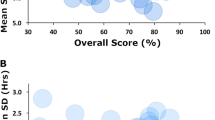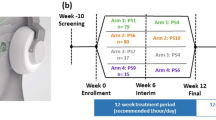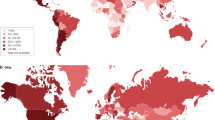Abstract
Objective: Elevated hearing thresholds have been demonstrated in populations afflicted by endemic cretinism as a result of severe iodine deficiency. However, data on the effects of less severe iodine deficiency on hearing thresholds in apparently normal children are scant. This study addresses the question whether there is a relationship among iodine variables, hearing and mental performance in a mildly iodine-deficient population.
Design: A randomized, placebo-controlled intervention trial with an observation period of 11 months.
Setting: An iodine-deficient area in northern Benin.
Subjects: A total of 197 school children, aged 7–11 y.
Interventions: A total of 97 children received an oral dose of iodized oil, containing 540 mg I, while 100 children received a placebo. About 3–4 months after supplementation, the whole population began to have access to iodized salt. Non-verbal mental tests were administered and biochemical indicators (thyrotropin, free thyroxine, thyroglobulin and urinary iodine) were measured at the beginning and the end of the study. Hearing was measured at the end of the study in both ears by pure-tone audiometry at seven frequencies.
Results: In this mildly iodine-deficient child population children with higher serum thyroglobulin concentrations had significantly higher hearing thresholds in the higher frequency range (≥2000 Hz) than children with lower serum thyroglobulin concentration. Moreover children with lower hearing thresholds performed significantly better on the mental tests used.
Conclusions: Even when iodine deficiency is ‘mild’, promotion of adequate iodine intake through salt iodization programs and other means remains crucial.
Sponsorship: Nestlé Foundation, Lausanne, Switzerland; Wageningen University, Wageningen, The Netherlands.
European Journal of Clinical Nutrition (2001) 55, 763–768
This is a preview of subscription content, access via your institution
Access options
Subscribe to this journal
Receive 12 print issues and online access
$259.00 per year
only $21.58 per issue
Buy this article
- Purchase on Springer Link
- Instant access to full article PDF
Prices may be subject to local taxes which are calculated during checkout
Similar content being viewed by others
References
Anand K, Mann SBS, Dash RJ & Mehra YN (1989) Auditory investigations in hypothyroidism Acta Otolaryngol. (Stockh.) 108 83–87
Azizi F, Kalani H, Kimiagar M, Ghazi A, Sarshar A, Nafarabadi M, Rahbar N, Noohi S, Mohajer M & Yassai M (1995) Physical, neuromotor and intellectual impairment in non-cretinous schoolchildren with iodine deficiency Int. J. Vitamin Nutr. Res. 65 199–205
Benmiloud M, Chaouki ML, Gutekunst R, Teichert HM, Wood WG & Dunn JT (1994) Oral iodized oil for correcting iodine deficiency: optimal dosing and outcome indicator selection J. Clin. Endocr. Metab. 79 20–24
Bircher, Hv (1883) Der endemische Kropf und seine Beziehungen zur Taubstummheit und zur Kretinismus Basel: Benno Schwabe
Boyages SC, Halpern JP, Maberly GF, Eastman CJ, Morris J, Collins J, Jupp JJ, Jin CE, Wang ZH & You CY (1988) A comparative study of neurological and myxedematous endemic cretinism in western China J. Clin. Endocrinol. Metab. 67 1262–1271
Boyages SC, Collins JK, Maberly GF, Jupp JJ, Morris J & Eastman CJ (1989) Iodine deficiency impairs intellectual and neuromotor development in apparently-normal persons. A study of rural inhabitants of north-central China Med. J. Aust. 150 676–682
Brucker Davis F, Skarulis MC, Pikus A, Ishizawar D, Mastroianni MA, Koby M & Weintraub BD (1996) Prevalence and mechanisms of hearing loss in patients with resistance to thyroid hormone J. Clin. Endocrinol. Metab. 81 2768–2772
Cremers WR, Bolder C, Admiraal RJ, Everett LA, Joosten FB, van Hauwe P, Green ED & Otten BJ (1998) Progressive sensorineural hearing loss and a widened vestibular aqueduct in Pendred syndrome Arch. Otolaryngol. Head Neck Surg. 124 501–505
Delong R (1987) Neurological involvement in iodine deficiency disorders. In The Prevention and Control of Iodine Deficiency Disorders, eds. BS Hetzel, JT Dunn & JB Stanbury 49–63 Amsterdam: Elsevier Science
Ekstrom RB, French JW & Harman HH (1979) Cognitive factors: their identification and replication Multivariate Behavioral Research Monographs 2
Forrest D (1996) Deafness and goiter: molecular genetic considerations J. Clin. Endocr. Metab. 81 2764–2767
Francois M, Bonfils P, Leger J, Czernichow P and Narcy P (1994) Role of congenital hypothyroidism in hearing loss in children J. Pediatr. 124 444–446
Goldey ES, Kehn LS, Rehnberg GL & Crofton KM (1995) Effects of developmental hypothyroidism on auditory and motor function in the rat Toxicol. Appl. Pharmac. 135 67–76
Goslings BM, Djokomoeljanto R, Hoedijono R, Soepardjo H & Querido A (1975) Studies on hearing loss in a community with endemic cretinism in Central Java, Indonesia Acta Endocrinol. Copenh. 78 705–713
Hebert R, Langlois JM & Dussault JH (1985) Permanent defects in rat peripheral auditory function following perinatal hypothyroidism: determination of a critical period Brain Res. 355 161–170
Leedman P (1996) Thyroid disease and hearing disorders: new genetic links Eur. J. Endocrinol. 135 394–395
Missler U, Gutekunst R & Wood W (1994) Thyroblobulin is a more sensitive indicator of iodine deficiency than thryotropin: development and evaluation of dry blood spot assays for thyrotropin and thyroglobulin in iodine-deficient geographical areas Eur. J. Clin. Chem. Clin. Biochem. 32 137–143
Pardede LV, Hardjowasito W, Gross R, Dillon DH, Totoprajogo OS, Yosoprawoto M, Waskito L & Untoro J (1998) Urinary iodine excretion is the most appropriate outcome indicator for iodine deficiency at field conditions at district level J. Nutr. 128 1122–1126
Rovet J, Walker W, Bliss B, Buchanan L & Ehrlich R (1996) Long-term sequelae of hearing impairment in congenital hypothyroidism J. Pediatr. 128 776–783
Ruiz-Marcos A, Salas J, Sanchez-Toscano F, Escobar del Rey F & Morreale de Escobar G (1983) Effect of neonatal and adult-onset hypothyroidism on pyramidal cells of the rat auditory cortex Devl. Brain Res. 9 205–213
Thurstone LL (1969) Primary Mental Abilities Chicago, IL: The University of Chicago Press
Untoro J (1999) Use of oral iodized oil to control iodine deficiency in Indonesia PhD thesis, Wageningen University, Wageningen
Valeix P, Preziosi P, Rossignol C, Farnier MA and Hercberg S (1992) Iodine intakes assessed by urinary iodine concentrations in healthy children aged ten months, two years, and four years Biol. Trace Elem. Res. 32 259–266
van den Briel T, West CE, Bleichrodt N, van de Vijver AJR, Ategbo EA & Hautvast JGAJ (2000) Improved iodine status is associated with improved mental performance of school children in Benin Am. J. Clin. Nutr. 72 1179–1185
Vanderschueren-Lodeweyckx M, Debruyne F, Dooms L, Eggermont E & Eeckels R (1983) Sensorineural hearing loss in sporadic congenital hypothyroidism Arch. Dis. Child. 58 419–422
Vermiglio F, Sidoti M, Finocchiaro MD, Battiato S, Lo Presti VP, Benvenga S & Trimarchi F (1990) Defective neuromotor and cognitive ability in iodine-deficient schoolchildren of an endemic goiter region in Sicily J. Clin. Endocrinol. Metab. 70 379–384
Wang YY & Yang SH (1985) Improvement in hearing among otherwise normal schoolchildren in iodine-deficient areas of Guizhou, China, following use of iodized salt Lancet ii 518–520
WHO (1983) Measuring change in nutritional status—guidelines for assessing the nutritional impact of supplementary feeding programmes for vulnerable groups Geneva: WHO
WHO Programme for the prevention of deafness and hearing impairment (PDH) (1999) Ear and hearing disorders survey protocol p 2 0 Geneva: WHO
WHO/Unicef/ICCIDD (1994) Indicators for assessing iodine deficiency disorders and their control through salt iodization Geneva: WHO
Author information
Authors and Affiliations
Corresponding author
Rights and permissions
About this article
Cite this article
van den Briel, T., West, C., Hautvast, J. et al. Mild iodine deficiency is associated with elevated hearing thresholds in children in Benin. Eur J Clin Nutr 55, 763–768 (2001). https://doi.org/10.1038/sj.ejcn.1601220
Received:
Revised:
Accepted:
Published:
Issue Date:
DOI: https://doi.org/10.1038/sj.ejcn.1601220



